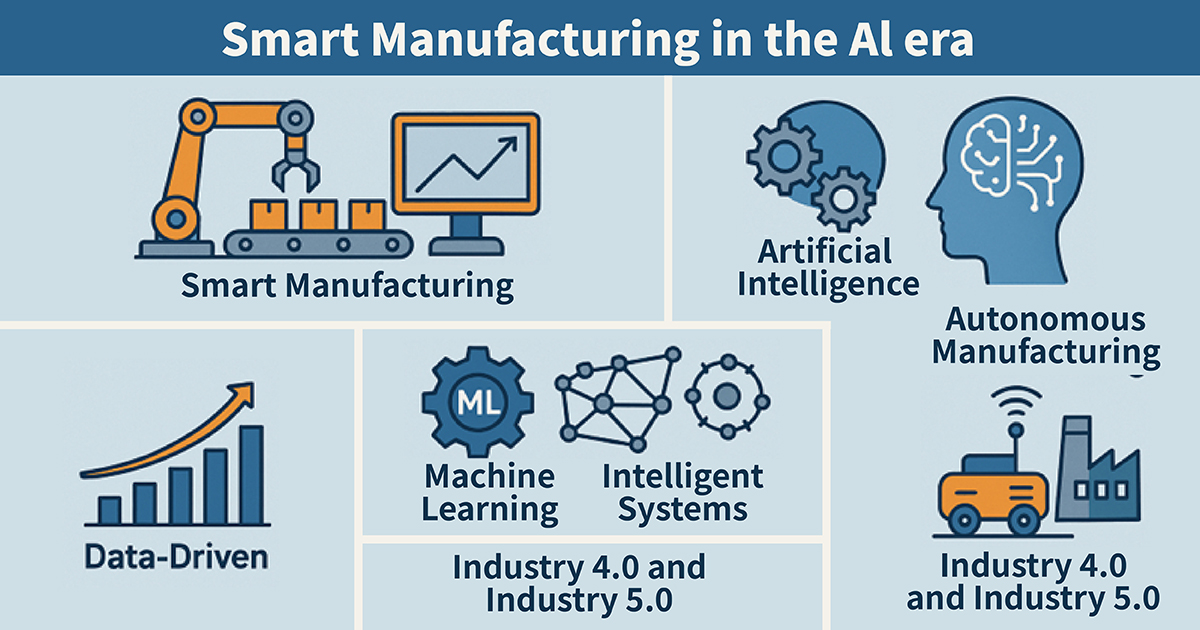Smart Manufacturing in the AI Era
A special issue of Big Data and Cognitive Computing (ISSN 2504-2289).
Deadline for manuscript submissions: 29 May 2026 | Viewed by 1348

Special Issue Editor
Interests: AI applications in manufacturing; autonomous manufacturing; physics-guided AI; machining; vibration prediction; high-end CNC machine tools
Special Issues, Collections and Topics in MDPI journals
Special Issue Information
Dear Colleagues,
We are pleased to extend an invitation to our upcoming Special Issue, titled “Smart Manufacturing in the AI Era”. This Special Issue aims to highlight cutting-edge advancements in which artificial intelligence (AI) plays a crucial role in transforming traditional manufacturing into intelligent, autonomous, and data-driven systems.
1) Introduction, including scientific background and highlighting the importance of this research area.
The convergence of computer science, mechanical and electrical engineering, and advanced manufacturing presents a powerful opportunity to revolutionize industrial systems through artificial intelligence. Despite rapid progress in computational models, a significant gap remains between theoretical developments and real-world implementation in manufacturing environments.
We invite researchers from diverse disciplines to submit innovative machine learning methods, AI-based approaches, or other smart computational algorithms that address challenges in computation, mechanical systems, electrical processes, and communication within manufacturing domains.
If you do not have access to experimental data, we encourage the use of open-source datasets for validation. Please feel free to contact us for guidance on dataset sources.
We also welcome collaborative submissions and joint publication efforts. Researchers who may need support with problem formulation, methodology development, or AI architecture benchmarking are encouraged to reach out—we are happy to provide guidance and collaborate on data analysis or model development.
2) Aim of the Special Issue and how the subject relates to the journal scope.
The goal of this Special Issue is to promote the development and application of fundamental and applied artificial intelligence or computational methodologies in the context of smart manufacturing. A key objective is to bridge the gap between theoretical computation and practical industrial applications, with an emphasis on intelligent decision making, automation, and process optimization throughout the manufacturing lifecycle.
This aim aligns with the journal’s mission to publish high-impact, interdisciplinary research that advances intelligent, sustainable, and efficient production systems. This initiative also offers opportunities for networking and team building, enabling researchers to collaborate based on their respective areas of expertise. Open datasets can be leveraged for model development and benchmarking.
3) Suggest themes.
We welcome both original research articles and comprehensive review papers. Topics of interest include, but are not limited to, the following themes:
- Machine learning and AI architectures tailored for manufacturing applications;
- Performance benchmarking of AI models in industrial environments;
- Computational strategies for smart, sustainable, and efficient manufacturing systems;
- AI applications in machining, additive manufacturing, forming, coating, and other production processes;
- Monitoring, fault diagnosis, and predictive maintenance using intelligent computational methodologies;
- Smart robotic control algorithm for industrial automation and collaborative operations in manufacturing environments;
- AI-driven logistics, including material flow management, warehouse operations, and supply chain optimization;
- Scheduling and resource planning enhanced by machine learning and advanced optimization techniques;
- Integration of AI into cyber-physical systems and Industry 4.0 infrastructures in the manufacturing domain.
I look forward to receiving your valuable contributions.
Dr. Jeong Hoon Ko
Guest Editor
Manuscript Submission Information
Manuscripts should be submitted online at www.mdpi.com by registering and logging in to this website. Once you are registered, click here to go to the submission form. Manuscripts can be submitted until the deadline. All submissions that pass pre-check are peer-reviewed. Accepted papers will be published continuously in the journal (as soon as accepted) and will be listed together on the special issue website. Research articles, review articles as well as short communications are invited. For planned papers, a title and short abstract (about 250 words) can be sent to the Editorial Office for assessment.
Submitted manuscripts should not have been published previously, nor be under consideration for publication elsewhere (except conference proceedings papers). All manuscripts are thoroughly refereed through a single-blind peer-review process. A guide for authors and other relevant information for submission of manuscripts is available on the Instructions for Authors page. Big Data and Cognitive Computing is an international peer-reviewed open access monthly journal published by MDPI.
Please visit the Instructions for Authors page before submitting a manuscript. The Article Processing Charge (APC) for publication in this open access journal is 1800 CHF (Swiss Francs). Submitted papers should be well formatted and use good English. Authors may use MDPI's English editing service prior to publication or during author revisions.
Keywords
- smart manufacturing
- advanced manufacturing
- autonomous manufacturing
- artificial intelligence
- machine learning
- intelligent systems
- data-driven
- Industry 4.0 and Industry 5.0
Benefits of Publishing in a Special Issue
- Ease of navigation: Grouping papers by topic helps scholars navigate broad scope journals more efficiently.
- Greater discoverability: Special Issues support the reach and impact of scientific research. Articles in Special Issues are more discoverable and cited more frequently.
- Expansion of research network: Special Issues facilitate connections among authors, fostering scientific collaborations.
- External promotion: Articles in Special Issues are often promoted through the journal's social media, increasing their visibility.
- Reprint: MDPI Books provides the opportunity to republish successful Special Issues in book format, both online and in print.
Further information on MDPI's Special Issue policies can be found here.





